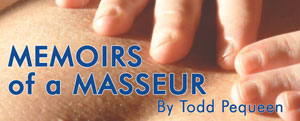Memoirs of a Masseur – August 2017
 The ebb and flow of the ocean, moon phases, and our days to nights it seems as if everything around us has a rhythm and a tempo. The world works in patterns as does energy, ying and yang, and the seasons. As humans why are many of us not in touch with our own natural cycles? How many among us let someone else set the rhythm of our lives and why? I spend much of my time observing people trying to understand them because nothing is more fascinating to me. As a body worker I have learned that tension lies not just in our flesh, but in the mind, heart, and soul as well. It is my job, if I am the best at what I do, to be able to understand peoples’ actions and behaviors and how that incorporates into their chosen lifestyle. I must physically feel as well as sense which parts of a body needs more or less work. A quality professional massage in itself has rhythm and tempo changes, high pressures and lows. This can only be possible with the ability to listen and to respond accordingly.
The ebb and flow of the ocean, moon phases, and our days to nights it seems as if everything around us has a rhythm and a tempo. The world works in patterns as does energy, ying and yang, and the seasons. As humans why are many of us not in touch with our own natural cycles? How many among us let someone else set the rhythm of our lives and why? I spend much of my time observing people trying to understand them because nothing is more fascinating to me. As a body worker I have learned that tension lies not just in our flesh, but in the mind, heart, and soul as well. It is my job, if I am the best at what I do, to be able to understand peoples’ actions and behaviors and how that incorporates into their chosen lifestyle. I must physically feel as well as sense which parts of a body needs more or less work. A quality professional massage in itself has rhythm and tempo changes, high pressures and lows. This can only be possible with the ability to listen and to respond accordingly.
A salesman must know when to press or when to sit back. My wife (a fabulous photographer) can prompt or pull back on her subjects to get the results she seeks. Remember your favorite teacher? Why do you think they stand out so profoundly? I propose it is because they knew when to stimulate and inspire, but more importantly when to be silent. Failures in life are not often caused from the lack of trying, they are caused from the inability to let the universe do what it does best, create or destroy. One must not force things—in life or on the massage table. Sports of all sorts are a passion of mine and another fine example of the nature of how things work. How I love witnessing a run in basketball, a momentum change in hockey, or UFC fights, or unanswered points by my hometown Buffalo Bills. As a distance runner I have learned the value of when to push or when to ease off and shift gears. An “in tune” dancer or surfer escapes him or herself by being 100% committed to what they are doing. They get in the zone and become something greater then themselves. Why then wouldn’t we do this with our work and personal lives? It is easy to learn simple practices and meditations to be more aware of ourselves and our actions. The value being an easier and more successful way of getting through our days, months, and years. The peaks and valleys of our lives need not be so extreme.
A little known invention called the clock changed everything. One of the oldest of human inventions it is an instrument to indicate, keep, and coordinate time. Mimicked today by our wrist watches, cell phones, dashboard of our vehicles, and our computers it sure seems important and hard to escape. That said I am constantly amazed at how late people are to appointments or meetings. Now let’s add artificial light, insane work weeks, poor diet, and stress—no wonder why it is almost impossible to follow or even know one’s own body rhythms. Do we eat to fuel ourselves or do we eat when the clock says it is time to? Study after study show that short siestas after lunchtime for example, or even 1/2 hour of exercise drastically increase productivity. Why then is this not a norm in society? I have friends that work best well into the night, personally I am on fire at sunrise. Physical, mental, and emotionally clear thoughts and actions should be suited toward one’s own rhythms. When you fight your own body you are sure to lose. Try your best to not be a slave to the clock or to perform like the mechanics of a clock—automated. Be willing to let go and in doing so you will return to yourself and your own rhythm and style.
(Todd Pequeen can be reached at 8830-7727 or at tpequeen@yahoo.com. He was the first masseur in Manuel Antonio and has been providing deep, therapeutic massages since 2000. His free time is spent reading, writing, surfing, and traveling.)

